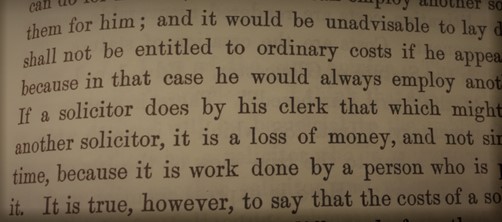In raising the fundamental equality of all before the law in the context of a lawyer’s costs in their own court proceedings, the High Court perhaps went a little too far. But an old rule in favour of lawyers’ costs has now been abolished, without, we are assured, impacting other more valid exceptions in the law of costs.
The High Court has abolished what is known as the Chorley exception.
As the Court explained, as a general rule, a self‑represented litigant may not obtain any recompense for the value of their time spent in conducting their own litigation. An exception to this is that a self‑represented litigant who is a solicitor may recover his or her professional costs of acting in the litigation.
This exception was established as a “rule of practice” by the English Court of Appeal in the 19th century in London Scottish Benefit Society v Chorley[1] and has generally been followed, including in Australia, with some reasoning behind it.
More background, including the view of the New Zealand Supreme Court, is given in my earlier comments at this link: The costs of lawyer litigants – ‘Chorley’ off to the High Court.
The High Court having previously said that the Chorley exception is “anomalous”[2], in Bell Lawyers v Pentelow [3] it rather grandly said that it is not only anomalous,
“it is an affront to the fundamental value of equality of all persons before the law. It cannot be justified by the considerations of policy said to support it. Accordingly, it should not be recognised as part of the common law of Australia”.
It likewise rejected the exception to barristers.
The High Court took the view that this
“would not disturb the well‑established understanding in relation to in-house lawyers employed by governments and others, that where such a solicitor appears in proceedings to represent his or her employer the employer is entitled to recover costs in circumstances where an ordinary party would be so entitled by way of indemnity”; although the Court went on to say that “whether the same view should be taken in relation to a solicitor employed by an incorporated legal practice of which he or she is the sole director and shareholder stands in a different position”.
It referred to DCT v Debaugy [2012] FMCA 451 among other cases as to the right of ATO lawyers to claim costs in acting on behalf of the Commissioner.
Gageler J noted that the
“step now taken to abandon the Chorley exception is a step which the Supreme Court of New Zealand chose not to take only last year”[4].
The High Court was unperturbed, saying that legislative obstacles which were of concern to the NZ Supreme Court do not apply in Australia.
Nettle J was not so sure. He referred to the concerns which led the NZ Supreme Court to that conclusion was the “practical inconsistency if the lawyer in person exception were to be abrogated but the employed lawyer rule retained”.
Justice Nettle said that it may be open to declare, as the majority judges did, that the abolition of the Chorley exception should not be taken to disturb those well-established understandings in relation to in-house solicitors employed by governments and others.
“But why should there be a distinction? There are potentially many forensic and social considerations relevant to a determination of whether the employed solicitor rule should be permitted to survive the Chorley exception, and, if so, in what form; and none of that analysis has been or can be undertaken in this proceeding”.
Nettle J therefore considered that the decision whether to abrogate the Chorley exception was something that should properly be left to government or at least to the court rules or law society committees.
Comment
While the rule is now abolished, the High Court did not go back further and explain the policy behind denying a litigant in person their costs, legal or otherwise, in defending or bringing a proceeding. While these might not be “professional costs”, the time take by self-litigants validly pursuing justice can be considerable. The courts themselves give much website and other assistance and guidance, perhaps encouragement, to those conducting their own litigation.
Then there is the question whether costs should be ordered at all against a losing party, or at least in certain types of litigation, for example that concerning the public interest.[5]
But these are matters beyond the particular case before the High Court and are in fact for law reform and the legislature.
The law of costs is embedded in our law, even to the extent, as the High Court also recently decided – Northern Territory v Sangare[6] – that impecuniosity was no barrier to costs being awarded against an unsuccessful litigant.
[1] (1884) 13 QBD 872 at 877.
[2] Cachia v Hanes (1994) 179 CLR 403 at 411; [1994] HCA 14.
[3] Bell Lawyers Pty Ltd v Pentelow [2019] HCA 2
[4] McGuire v Secretary for Justice [2018] NZSC 116.
[5] “Public interest litigation: mitigating adverse costs order risk” [2016] PrecedentAULA 62; (2016) 136 Precedent 22, Eliza Ginnivan.
[6] [2019] HCA 25



